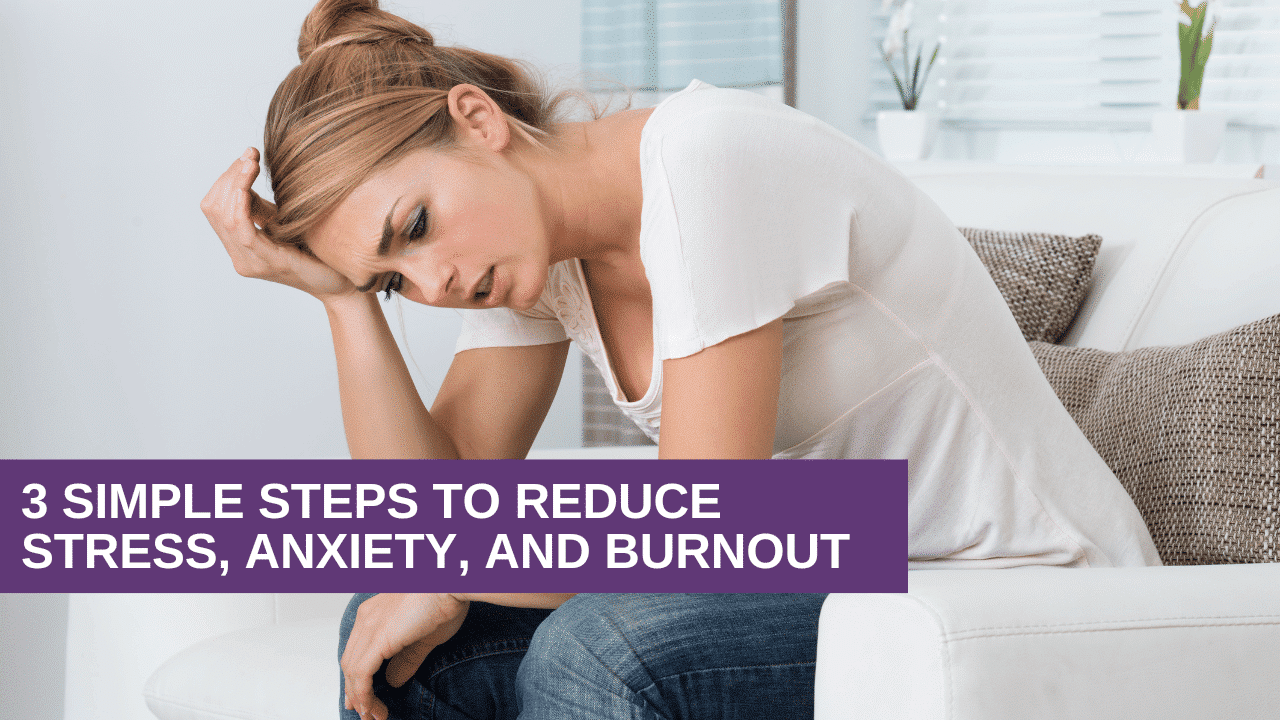How do you reduce stress, anxiety and burnout? Here are three simple steps.
Stress, anxiety, and burnout can affect anyone and have been particularly difficult during these pandemic years, especially for US healthcare workers, but for anybody who’s had to deal with illness themselves, or ill family members, as well as financial crisis and other stressors.
I teach my patients three very simple things that they can do in order to reduce their stress.
#1 Get enough Sleep.
If you don’t get enough sleep, you’re not going to be able to reduce the effects of stress hormones on your body. You will continue to have catabolic hormones floating through your system breaking down body parts. Producing enough melatonin every night helps reverse insulin resistance and reduces your cortisol levels. In order to sleep deeply, you must sleep in the complete dark. You may need to use white noise to help you sleep. And it’s best to avoid getting on any kind of screen that’s reflecting a blue light like a television screen, computer screen, or any of your devices after dusk because that will delay your melatonin production.
Be sure your room is at a proper temperature which means 60 to 70 degrees to get deep sleep. It’s best if you can wake up with the sun and start a healthy circadian rhythm. But adjust your sleep hours according to your work schedule. And be sure you’re getting at least seven to nine hours of sleep at night. Using a monitor like fitness span to determine how much deep sleep you’re getting can be helpful. If your anxiety is preventing you from falling asleep or staying asleep, there are supplements that can help at least reset your circadian rhythm. I developed a protocol for my patients called My DMAR sleep cocktail, which helps them initiate sleep and stay asleep but it’s only used for a few weeks to reset their circadian rhythm.
#2 Activate your parasympathetic nervous system.
Your parasympathetic nervous system is the calm half of your autonomic nervous system. Your sympathetic nervous system is the rev-up half. Both your parasympathetic nervous system and sympathetic nervous system are controlled by your hypothalamus. You can activate your parasympathetic nervous system through deep breathing. Taking very slow deep controlled breaths, holding them for a few seconds, and slowly exhaling – twice as long as it took you to inhale and repeat at least a few times. Conscious deep breathing can help activate the parasympathetic nervous system so you produce GABA.
GABA is a neuropeptide that calms down your excited nervous system. It will make you feel calm and relaxed. Benzodiazepines like Valium and Xanax fill the GABA receptors to mimic GABA, but producing your own natural GABA is key. I have a CALM meditation that helps to activate your parasympathetic nervous system through deep breathing with scent and sound. So anytime you’re in a really stressful situation all you need to do is breathe that scent or hum a few tunes of your soothing music and you will naturally produce GABA and calm down. You can get my CALM meditation by signing up for my free Hormone Reboot Training.
#3 Support your hypothalamus.
The third step to reduce stress, anxiety, and burnout is to support your hypothalamus. Yes, I know I talk about your hypothalamus all the time. It’s well known in research that chronic stress, anxiety, and mood disorders, including PTSD which affects hypothalamic function. People who’ve been under chronic stress who had chronic stress and anxiety have 5% reduction in their hypothalamic mass. So I recommend Genesis Gold® which is formulated specifically to support your hypothalamus. That way your hypothalamus gets the nutrients that it needs to function optimally, including optimizing the hypothalamic-pituitary-adrenal axis, so it’s not overfiring and producing enough calming neurotransmitters, like GABA to calm down your nervous system. Your hypothalamus controls your autonomic nervous system.
A stressed hypothalamus does not turn on the parasympathetic nervous system appropriately. Your hypothalamus becomes even more stressed when it doesn’t get the nutrients it needs and it’s difficult to get everything you need from your diet alone. I’ve had patients and clients describe since being on Genesis Gold® feeling more mellow and more calm. But healing your hypothalamus doesn’t happen overnight. It may take a few weeks to start feeling better. And for some people with PTSD, panic attacks, and chronic stress issues, it may take a few months to correct the hypothalamic-pituitary-adrenal axis, so be patient.
Your hypothalamus can be healed if you give it what it needs to heal. If you have any questions about reducing stress, anxiety and burnout, please join me in our Hormone Support Group, which you can access by signing up for my free Hormone Reboot Training.



0 Comments